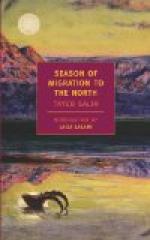At five in the morning there is a drawing-in of the fleet to Pelican Portage. Before two hours have passed the grasshopper has become a burden, and it is 102 deg. in the shade, and no shade to be had. We are now a hundred miles from Athabasca Landing. On the left bank we come across a magnificent gas-well with a gush of flame twenty or thirty feet in height.
It seems that eleven years ago, seeking for petroleum, the Dominion Government had a shaft sunk here; their boring apparatus was heavy, the plunger with its attachment weighing nearly a ton. At eight hundred feet the operator broke into an ocean of gas, and the pressure blew him with plunger and appliances into the air as a ball comes from a cannon-bore. The flow of gas was so heavy that it clogged his drills with maltha and sand, and from then to now the gas has been escaping. To-day the sound of the escape ricochets up and down the palisaded channel so that we cannot hear each other speak. There is gas enough here, if we could pipe it and bring it under control, to supply with free illumination every city of prairie Canada. It has destroyed all vegetation for a radius of twenty yards; but, oddly enough, outside this range of demarcation the growth is more luxuriant and comes earlier and stays later than that of the surrounding country. One redheaded Klondiker, ignorant of gas and its ways, ten years ago struck a match to this escaping stream, was blown into the bushes beyond, and came out minus hair, eye-brows and red beard—the quickest and closest shave he ever had. The shells of birds’ eggs, tea-leaves from many a cheering copper-kettle, tufts of rabbit-hair, and cracked shin-bones of the moose, with here a greasy nine of diamonds, show, this Stromboli of the Athabasca to be the gathering-place of up and down-river wanderers. You can boil a kettle or broil a moose-steak on this gas-jet in six minutes, and there is no thought of accusing metre to mar your joy. The Doctor has found a patient in a cabin on the high bank, and rejoices. The Indian has consumption. The only things the Doctor could get at were rhubarb pills and cod-liver oil, but these, with faith, go a long way. They may have eased the mind of poor Lo, around whose dying bunk we hear the relatives scrapping over his residuary estate of rusty rifle, much-mended fishing-net, and three gaunt dogs.
We pass House River, and the devout cross themselves and murmur a prayer. The point is marked by a group of graves covered with canvas. Here years ago a family of four, travelling alone, contracted diphtheria, and died before help could reach them. There is another legend of which the boatmen unwillingly speak, the story of the Wetigo, or Indian turned cannibal, who murdered a priest on this lonely point, and ate the body of his victim. The taste for human flesh, Philip Atkinson assures us, grows with the using, and this lunatic of long ago went back to the camps, secured an Indian girl as bride, carried her to this point, took her life, and ate of her flesh. It is a gruesome story.




